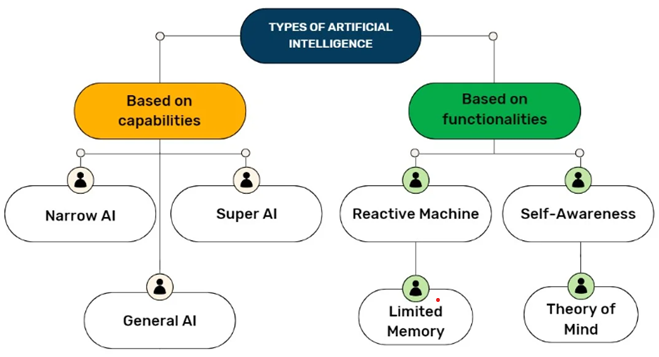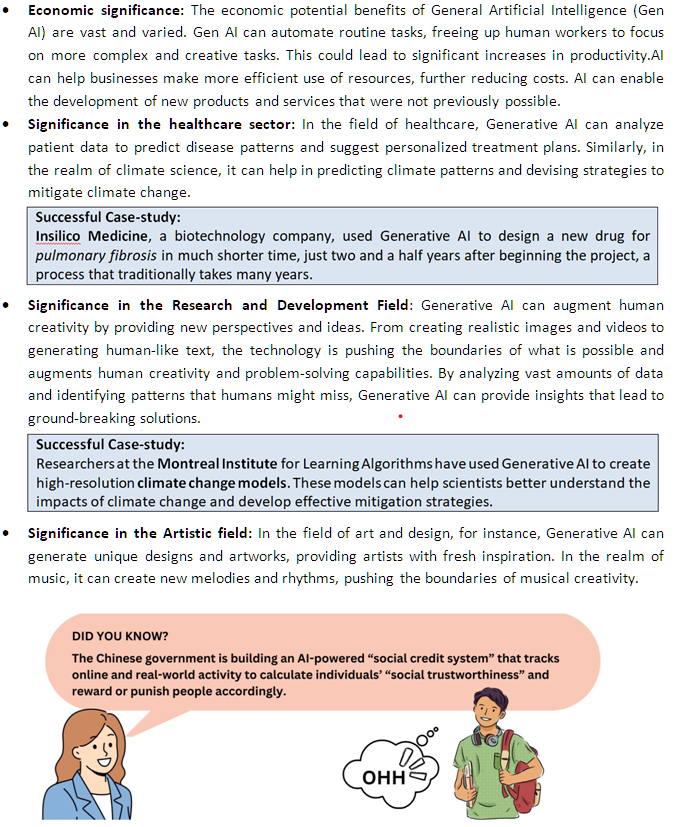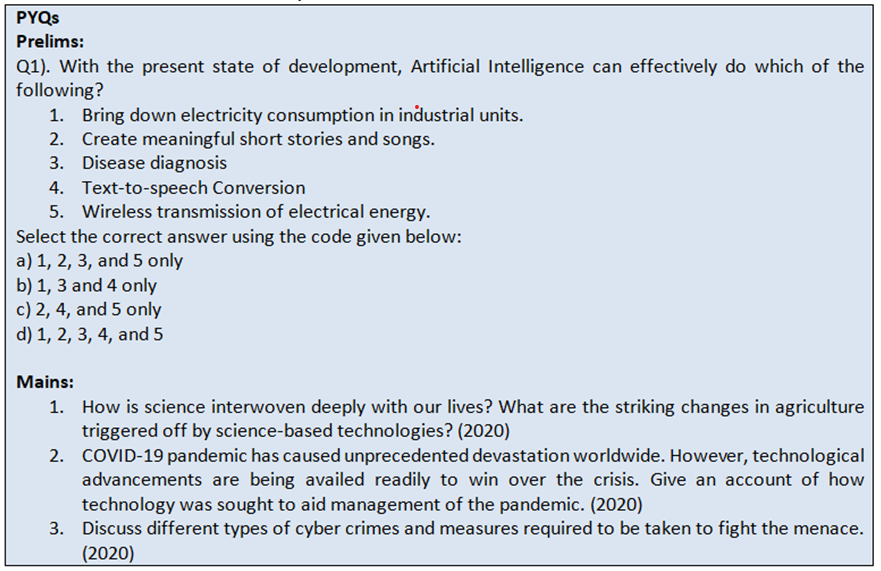Harnessing Generative AI
Relevance: GS III (Science and Technology)
- Prelims: Emerging Technologies; Artificial Intelligence; Generative AI;
- Mains: Challenges and Opportunities in Artificial Intelligence;
Why in News?
As Generative AI becomes more sophisticated, there is a growing concern that it could start making decisions that humans do not understand or agree with.
What is Artificial Intelligence (AI)?
- AI refers to the meticulous process of constructing intelligence systems by harnessing vast amounts of data. AI does this by acquiring knowledge from past experience and learning that eventually trains the system to perform human-like tasks.
- Through complex algorithms and methodologies, programmers can create machines that are capable of independent decision-making.
- AI can be divided into two main categories: based on capabilities and based on functionalities. These categories reflect the range and applications of AI given how complex the technology can become.

What is Generative AI?
Generative AI refers to models or algorithms that create brand-new output, such as text, photos, videos, code, data, or 3D renderings, from the vast amounts of data they are trained on. The models 'generate' new content by referring back to the data they have been trained on, making new predictions.
Why Generative AI is currently under debate?
- The term generative AI is causing a buzz because of the increasing popularity of generative AI programs, such as Open AI's conversational Chatbot ChatGPT and the AI image generator DALL-E.
- As Generative AI becomes more sophisticated, there is a concern that it could start making decisions that humans do not understand or agree with. This fear is often linked to the concept of the ‘singularity’, a hypothetical point in the future when AI surpasses human intelligence.
- The debate, however, is never-ending and this coin has two sides as given below:
The negative side of Generative AI:
So, why are we afraid of Generative AI? The dystopian fear of Generative AI is a complex issue that is deeply rooted in societal and cultural perceptions of technology:
- Replacing human potential: The narrative typically revolves around the idea that as AI becomes more advanced and autonomous, it could potentially overpower humans, leading to a horrendous future. One of the primary fears is that Generative AI, with its ability to create new data and mimic human-like creativity, could outperform humans in various tasks, leading to widespread job displacement.
- Can bring more Inequality in Society: Instead of generating productivity improvements that increase GDP and prosperity, AI may boost productivity while driving down GDP. An abundance of cheaper stuff will help in the decline in business expenditure and maintenance, but will also decline wages, growing economic inequality, less work all around, and the emergence of millions of ‘ZEVs’—people of Zero Economic Value—individuals you would not hire even if they worked for free. Hence, Generative AI can be productive for the corporate world but is a threat to Social equity and equality.
- Issue of ‘Singularity’: As Generative AI becomes more sophisticated, there is a concern that it could start making decisions that humans do not understand or agree with. This fear is often linked to the concept of the ‘singularity’, a hypothetical point in the future when AI surpasses human intelligence. There is also a fear that AI could be used for malicious purposes. For instance, Generative AI could be used to create deep fakes, which are realistic but fake images or videos. These could be used to spread misinformation or propaganda, leading to societal unrest.
- A new era of warfare: The prospect of autonomous AI weapons of war is indeed a significant concern and a source of dystopian fear. These weapons often referred to as lethal autonomous weapons systems (LAWS), are capable of selecting and engaging targets without human intervention. The fear is that these weapons could potentially change the nature of warfare, making it more impersonal and deadly.
- Ethical perspective: One of the primary concerns is the ethical implications of delegating life-and-death decisions to Generative AI command and control. Critics argue that Generative AI lacks the human qualities of compassion and judgment, which are crucial in making ethical decisions in warfare. There is a fear that autonomous weapons could potentially be used in ways that violate international humanitarian law.
The positive side of Generative AI:
The greatest potential of Generative AI lies not in replacing humans, as many fear, but in assisting us in our efforts to create hitherto unimaginable solutions. Generative AI, with its ability to forge new data from existing ones, has the potential to revolutionize various sectors.

Way Ahead for Implementing Generative AI:
- Updating with trends and finding more solutions: It is important to note that while AI may replace certain jobs, it also has the potential to create new ones and free up humans to focus on more complex and creative tasks.
- Need to change current perspective: The successful integration of Generative AI in our problem-solving and creative processes requires a shift in perspective. Instead of viewing AI as a threat to human jobs and creativity, we need to see it as a tool that can enhance our capabilities.
- Need for a robust design and monitoring: it is important to remember that AI is a tool created by humans. Its development and use are guided by human decisions. Therefore, the key to preventing a dystopian future lies in responsible and ethical AI development and use. This includes creating robust regulations, prioritizing transparency and accountability in AI systems, and ensuring that AI is used to augment human capabilities and not replace them.
What would be the impact of generative AI in the future is hard to say. But as we continue to harness these tools to automate and augment human tasks, we will inevitably find ourselves having to reevaluate the nature and value of human expertise. As generative AI becomes increasingly, and seamlessly, incorporated into business, society, and our personal lives, we should expect a new regulatory climate to take shape!


